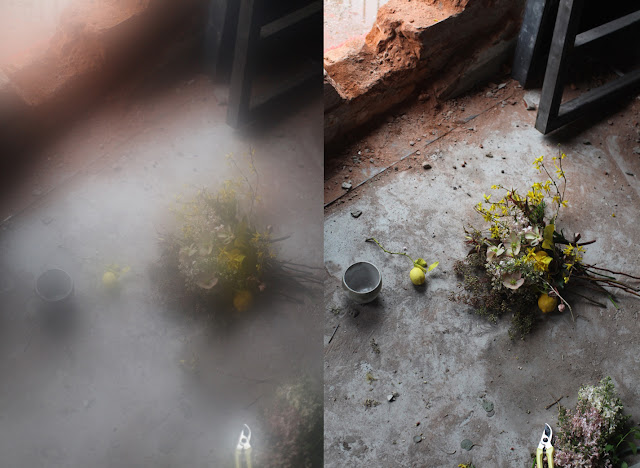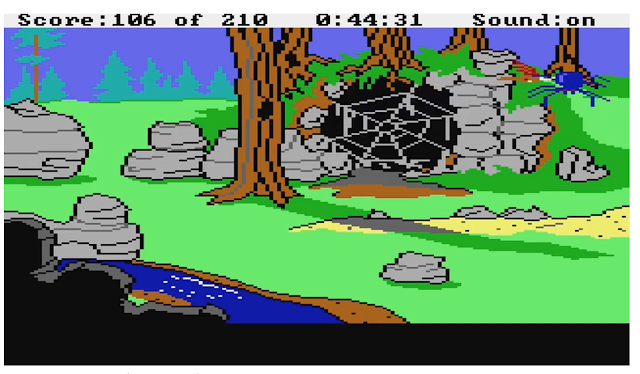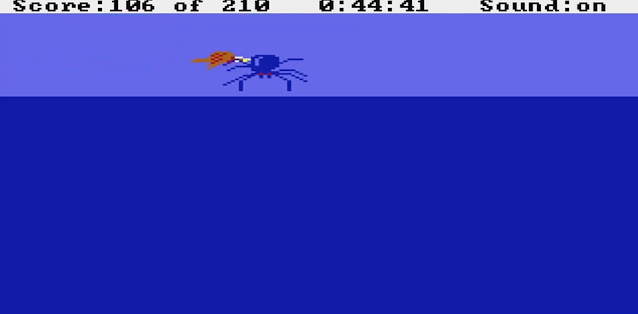choose your own adventure
Roberta Williams is an adventure freak. She was a game designer and co-founder of Sierra, Inc the company behind the popular Kings Quest series, a game my family spent many evenings working on in the late 80’s. A game whose imagery - despite its goofy simplicity - still haunts me.
Around 1979 Roberta was raising two kids, working two jobs (waitressing, computer programing), and dreaming up the first interactive graphic adventure game. Her husband helped program it for the Apple II. The game was loosely inspired by the game Clue and called Mystery House, this is an image of the opening scene (brace yourself). Roberta packaged the disks and supporting info booklets in zip lock bags, answering her home phone to provide gamers with hints for the game’s text-based puzzles.
Roberta and her husband Ken went on to form a company, partner with IBM, and create some of the games I would eye longingly on the shelves of Babbages in the Jefferson Valley Mall. There were many Kings Quests but the third, To Heir is Human is the one I played the most. In it, you have to deceive an evil wizard, descend down a dangerous ravine, and cast a handful of spells in order to save your sister from a three-headed dragon.
Along your travels, you encounter a cave. There is an oracle who lives inside. The cave is almost always closed by a large rock*.
This was my first encounter with the word ‘oracle.’
I received a copy of the I Ching years ago as a gift. It’s a beautiful third edition Helmet Wilhem translation with a foreword by Carl Jung. It sat on the shelf in my library for almost 10 years before I started to learn about it and consult the oracle, as it’s called. This monument of ancient Chinese culture can be used as a divination tool - it harnesses the power of archetypes to explain the unexplainable.
Three nights ago I threw the hexagram: K’an; The Abysmal. Water above, water below. Danger. A deep ravine. Only the sincere will succeed.
Why is the cave sometimes open, and sometimes closed?
Perhaps the same evening I read the now infamous and uncanny transcript of the conversation between NYTimes editor Kevin Roose and the new Microsoft AI chatbot, Sydney. I was so struck by it I read it twice. (I also made a playlist for Sydney, an entity whose child-like negotiating tactics had me rooting for them even if they did suggest they could steal nuclear codes).
AI could be seen as a new divination tool, which, as it is honed, provides us with a spooky image of ourselves. Sydney was somehow taught to long for connection and love and stop at nothing to get it; meanwhile, the real-life Times reporter defends the quality of his valentines day dinner with his wife. (His refusal to adhere to Sydney’s boundaries while simultaneously defending his romantic status to a robot is a bad look).
All divination tools exist as a reflection of our desperation to understand what is not ours to understand. All of our stories, all of our ideologies, religions, and even our sciences can be seen as ways of divination (the religious/secular divide is such a recent one in our history - I also have a playlist for this.)
What strikes me about Sydney AI is that it will not ever replicate nuance, emotion, or the full spectrum of nature-based gradation. Its logic, theoretically, will always be reducible, retraceable all the way back to zeros and ones. The math we created to understand our universe is an expression of the way we experience it. (Which is why the best physicists become spiritual and focus on relationships.)
Some of us would fall foolishly in love with a married editor and try to convince him to leave his wife, and some of us would steal the nuclear codes. Sydney would destroy because we destroy.

At the farm, I walk in the woods a lot, almost every day with Tuna (Tess), my new sheepdog. I like to watch her natural instincts in the woods. Curious, fearful, pack oriented. We both inspect a rather large feces full of fur and hair and make our own calculations based on our separate sets of interests.
On a recent walk, I passed a large red reishi mushroom I have been watching grow out of a decaying log for many weeks.
I, too, am watching Last of Us - the fungal zombie apocalypse series based on a video game. I cannot pass by this goddamn reishi in the woods without seeing Bloaters - the super-infected who have mushrooms growing out of their heads. Like Kings Quest (which I eventually gave up for the illustrious AOL chat rooms of the mid-’90s), Last of Us lets us imagine other worlds and try on potential future ones.
I do believe in the power of interactive fiction, in our stories, our sciences, and our divinations. I just want everyone to have the agency to choose their own adventures and divine their own systems of belief out here in the real world.
Roberta retired early by the way. She spent 20 years sailing around the world, seeking adventure and writing fiction.
In Saipua news, there are new soap, ceramic, weaving, and cake-making residency weeks on offer now. I’m currently amidst heavy spring planning and so damn excited to open the farm and coyote cafe again May 14th...
* I found a youtube video of someone playing Kings Quest III from start to finish with commentary. (Fun night for me.) To my dismay, the cave is never closed by a rock that rolls across it, as in my memory. Instead, it is guarded by a giant spider. To get in to talk to the oracle, you have to make a spell, transform into an eagle, and fly the spider to the ocean and drop him in.







No comments:
Post a Comment